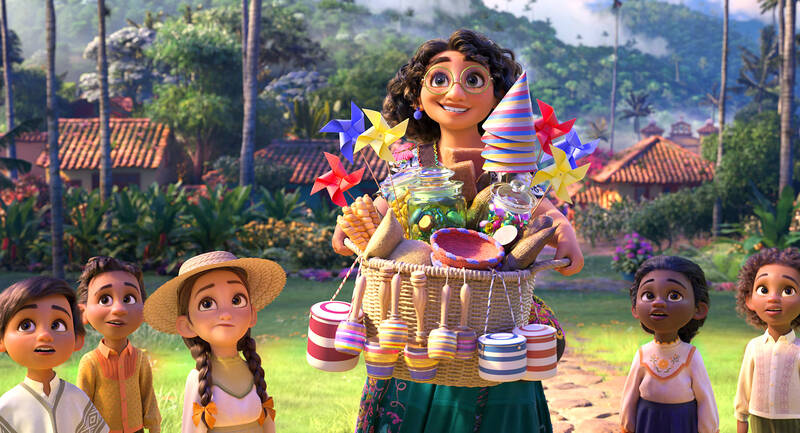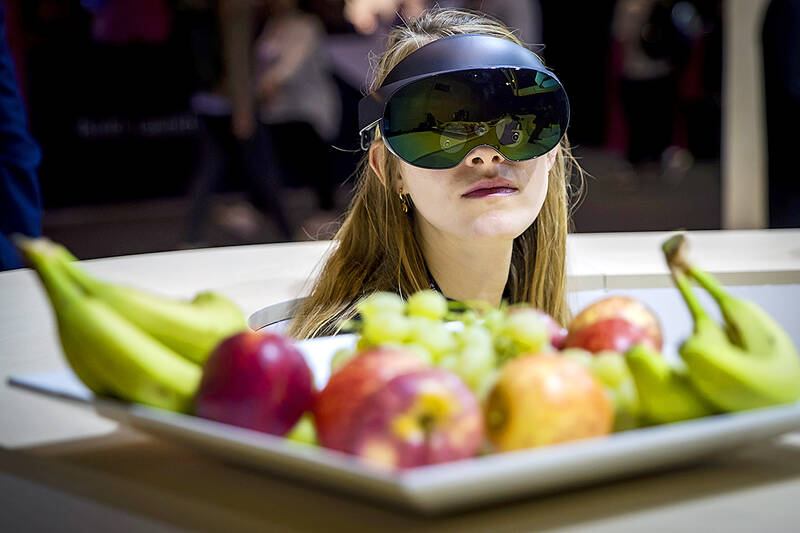British schoolgirl Lowri Moore is just 13 but has achieved a lot in her short life, championing children who like her wear glasses.
Aged nine, she persuaded Disney to create a bespectacled heroine for the first time, in the hit film Encanto.
Her #GlassesOn campaign has meanwhile struck a chord with thousands of young people and their parents around the world.

Photo: AP
Now she has another US giant in her sights.
The teenager from Nottinghamshire, central England, is urging the body responsible for all new emojis to give people the option to put glasses on them.
She says many people believe that children being stigmatized for wearing glasses is a thing of the past.

Photo: EPA-EFE
But she argues many children still resist wearing their glasses for fear of appearing “different or uncool.”
Research shows children with spectacles are over 35 percent more likely to be bullied at school, and not wearing them can have far-reaching consequences.
“We are in touch with a professor who works in Botswana to give children glasses and he said that most of the children that get glasses don’t want to wear them for fear of being different and not cool,” Lowri said.
‘BIGGEST FAN’
She said that without glasses you need, “you won’t be able to learn and that will limit your job options and you will probably really struggle in life all because you didn’t wear your glasses. That’s not fair.”
Lowri’s latest campaign was sparked when her mother Cyrilyn tried to find an emoji relevant to her daughter.
“She was looking for an emoji that would represent me but all she found was a nerd. She kept on looking and there was a granny and a teacher but obviously that doesn’t represent me,” she said.
Lowri said it was great there were some bespectacled emojis, but three was not enough.
“It’s not really positive so we’re just asking for the option of putting glasses onto already existing emojis,” she said after handing in copies of her letter at the London offices of tech giants Google and Meta on Wednesday.
Lowri’s campaigning began in 2019 when she wrote to Disney calling for more characters with glasses in their films.
Two years later, the Encanto character Mirabel Madrigal hit the big screen.
Director Jared Bush revealed he had been inspired by the schoolgirl’s letter, telling her: “I am your biggest fan, I’m so impressed by you.”
The director also said he had wanted to let her know much earlier, but had to keep it secret until the movie was in the bag.
‘NEGATIVE STEREOTYPES’
In her latest letter, Lowri praised the Unicode Consortium, the non-profit organization based in California that oversees new emojis, for offering users more choice.
But she urged them to go further.
“I’d love to see the option to add glasses to face emojis, similar to changing skin color or hair color as you have already made available,” she wrote.
Having the current “nerd” emoji as the only one available for young people could be “damaging as it helps to confirm the negative stereotype and stigma that we are trying hard to destroy”, she added.
Lowri’s campaigning success was recognized earlier this year when she was named “Campaigner of the Year” by the International Agency for the Prevention of Blindness (IAPB).
Failing to wear glasses can prevent children’s eyes from developing normally and lead to avoidable eye conditions.
Jessica Thompson of the IAPB, which works in over 100 countries worldwide, said Lowri’s advocacy was helping to highlight the damage to children’s futures of not wearing glasses.
“If you struggle to see, you struggle to learn,” she said.
Wearing glasses was the single “most effective” health intervention for schoolchildren, “reducing the odds of failing a class by 44 percent”, she added.

The unexpected collapse of the recall campaigns is being viewed through many lenses, most of them skewed and self-absorbed. The international media unsurprisingly focuses on what they perceive as the message that Taiwanese voters were sending in the failure of the mass recall, especially to China, the US and to friendly Western nations. This made some sense prior to early last month. One of the main arguments used by recall campaigners for recalling Chinese Nationalist Party (KMT) lawmakers was that they were too pro-China, and by extension not to be trusted with defending the nation. Also by extension, that argument could be

Aug. 4 to Aug. 10 When Coca-Cola finally pushed its way into Taiwan’s market in 1968, it allegedly vowed to wipe out its major domestic rival Hey Song within five years. But Hey Song, which began as a manual operation in a family cow shed in 1925, had proven its resilience, surviving numerous setbacks — including the loss of autonomy and nearly all its assets due to the Japanese colonial government’s wartime economic policy. By the 1960s, Hey Song had risen to the top of Taiwan’s beverage industry. This success was driven not only by president Chang Wen-chi’s

Last week, on the heels of the recall election that turned out so badly for Taiwan, came the news that US President Donald Trump had blocked the transit of President William Lai (賴清德) through the US on his way to Latin America. A few days later the international media reported that in June a scheduled visit by Minister of National Defense Wellington Koo (顧立雄) for high level meetings was canceled by the US after China’s President Xi Jinping (習近平) asked Trump to curb US engagement with Taiwan during a June phone call. The cancellation of Lai’s transit was a gaudy

The centuries-old fiery Chinese spirit baijiu (白酒), long associated with business dinners, is being reshaped to appeal to younger generations as its makers adapt to changing times. Mostly distilled from sorghum, the clear but pungent liquor contains as much as 60 percent alcohol. It’s the usual choice for toasts of gan bei (乾杯), the Chinese expression for bottoms up, and raucous drinking games. “If you like to drink spirits and you’ve never had baijiu, it’s kind of like eating noodles but you’ve never had spaghetti,” said Jim Boyce, a Canadian writer and wine expert who founded World Baijiu Day a decade